Weronika Hryniewska-GuzikI am Senior Researcher (AI) in Huawei Poland. I am working on LLM optimizations, especially memory-related ones. I received a PhD at the Faculty of Mathematics and Information Science at Warsaw University of Technology in Poland, where I specialized in responsible, explainable Deep Learning on lung images. My PhD supervisor was Przemysław Biecek. I have a MSc in Computer Science from Łódź University of Technology. I have a BSc in Mechatronics from Warsaw University of Technology. |

|
ResearchI'm interested in deep learning, computer vision, and multi-modality. |
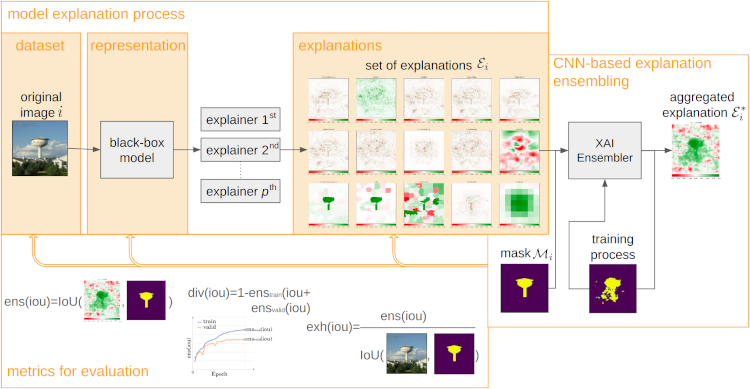
|
CNN-based explanation ensembling for dataset, representation and explanations evaluationWeronika Hryniewska-Guzik, Luca Longo, Przemysław Biecek World XAI Conference, 2024 arxiv / code / This research investigates the potential of combining explanations generated by deep learning classification models using convolutional models to create a more coherent and reliable understanding of the model’s behavior. Using introducted metrics, the paper addresses how these explanations aid in assessing datasets, representations, and explanations. |
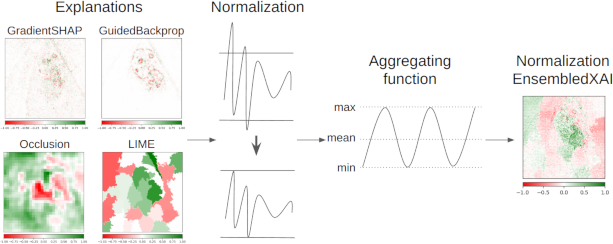
|
NormEnsembleXAI: Unveiling the Strengths and Weaknesses of XAI Ensemble TechniquesWeronika Hryniewska-Guzik, Bartosz Sawicki, Przemysław Biecek preprint, 2024 arxiv / code / This research analyzes methods for ensembling explainable AI (XAI) techniques. We introduce new method NormEnsembleXAI, analyze the strengths and weaknesses of XAI ensembles, and provide a library facilitating the practical implementation of XAI ensembling. |
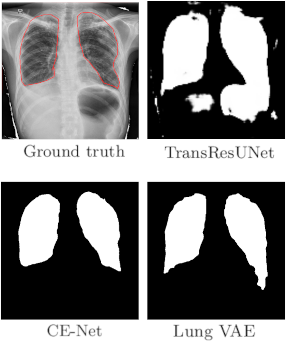
|
A comparative analysis of deep learning models for lung segmentation on X-ray imagesWeronika Hryniewska-Guzik, Jakub Bilski, Jakub Brojacz, Bartosz Chrostowski, Jakub Drak Sbahi, Przemysław Biecek PP-RAI conference, 2024 arxiv / code / This study evaluates deep learning solutions for lung segmentation in X-rays, ranking existing methods and analyzing their performance under diverse image modifications. Out of 61 analyzed papers, only nine offered implementation or pre-trained models, enabling assessment of three prominent methods: Lung VAE, TransResUNet, and CE-Net. |
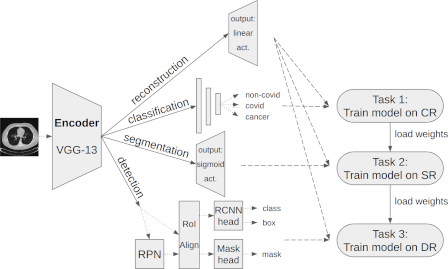
|
Multi-task learning for classification, segmentation, reconstruction, and detection on chest CT scansWeronika Hryniewska-Guzik, Maria Kędzierska, Przemysław Biecek PP-RAI conference, 2023 paper / A novel multi-task framework for classification, segmentation, reconstruction, and detection. To the best of our knowledge, we are the first ones who added detection to the multi-task solution. Additionally, we checked the possibility of using two different backbones and different loss functions in the segmentation task. |
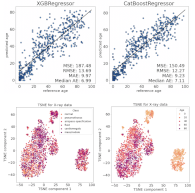
|
Challenges facing the explainability of age prediction models: case study for two modalitiesMikołaj Spytek, Weronika Hryniewska-Guzik, Jarosław Zygierewicz, Jacek Rogala, Przemysław Biecek Aging Hackathon at the 7th International workshop on Health Intelligence (W3PHIAI-23) at AAAI-23 Conference, 2023 arxiv / code / We investigate the use of Explainable Artificial Intelligence (XAI) for age prediction focusing on two specific modalities, EEG signal and lung X-rays. We share predictive models for age to facilitate further research on new techniques to explain models for these modalities. |
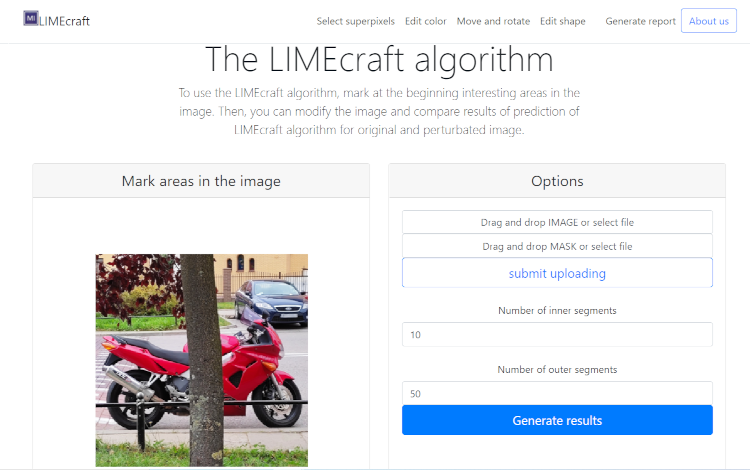
|
LIMEcraft: Handcrafted superpixel selection and inspection for Visual eXplanationsWeronika Hryniewska, Adrianna Grudzień, Przemysław Biecek Machine Learning, 2022 paper / arxiv / code / We propose an approach called LIMEcraft that allows a user to interactively select semantically consistent areas and thoroughly examine the prediction for the image instance in case of many image features. |

|
Prevention is better than cure: a case study of the abnormalities detection in the chestWeronika Hryniewska, Piotr Czarnecki, Jakub Wiśniewski, Przemysław Bombiński, Przemysław Biecek CVPR Workshops (Beyond Fairness: Towards a Just, Equitable, and Accountable Computer Vision), 2021 paper / poster / Faults in the data acquisition and annotation process in a dataset for detection of abnormalities in X-ray lung images. |

|
Checklist for responsible deep learning modeling of medical images based on COVID-19 detection studiesWeronika Hryniewska, Przemysław Bombiński, Patryk Szatkowski, Paulina Tomaszewska, Artur Przelaskowski, Przemysław Biecek Pattern Recognition, 2021 paper / arxiv / code / The review study of approaches proposed in the numerous Machine Learning articles and indication of typical errors emerging from the lack of deep understanding of the radiography domain. We present the perspective of both: experts in the field - radiologists and deep learning engineers dealing with model explanations. The final result is a proposed checklist with the minimum conditions to be met by a reliable COVID-19 diagnostic model. |
TeachingTeaching assistance in courses. |
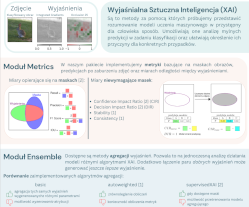
|
Ensemble explanations in image classificationWUT Supervising BSc thesis 2023-02-07 website1 / |
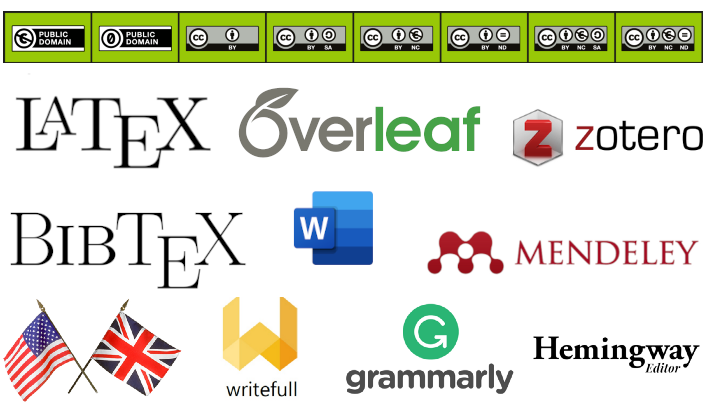
|
Case Study - What should you know before writing your thesisWUT Course for Data Science BSc (lecture) 2022-03-01 code / website1 / website2 / blog / |

|
Case Study - Preparing and training models on tabular, text and image dataWUT Course for Data Science BSc (laboratory, project) 2022-03-01 code / website1 / website2 / |
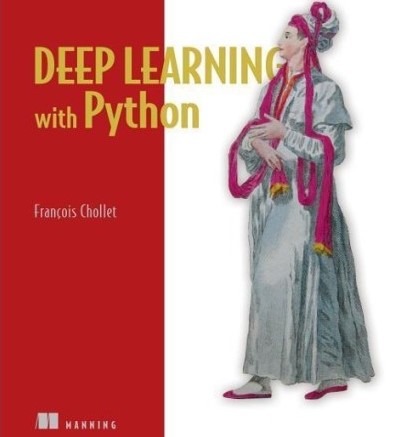
|
Case Study - Deep Learning on medical image dataWUT Course for Data Science BSc (laboratory, project) 2021-03-01 slides / code / website1 / website2 / |

|
Text MiningWUT Course for Data Science MSc (supporting assistant at laboratory and project) 2020-10-01 website / This course focuses on basic theory, advanced models and methods for information retrieval in large textual datasets. |